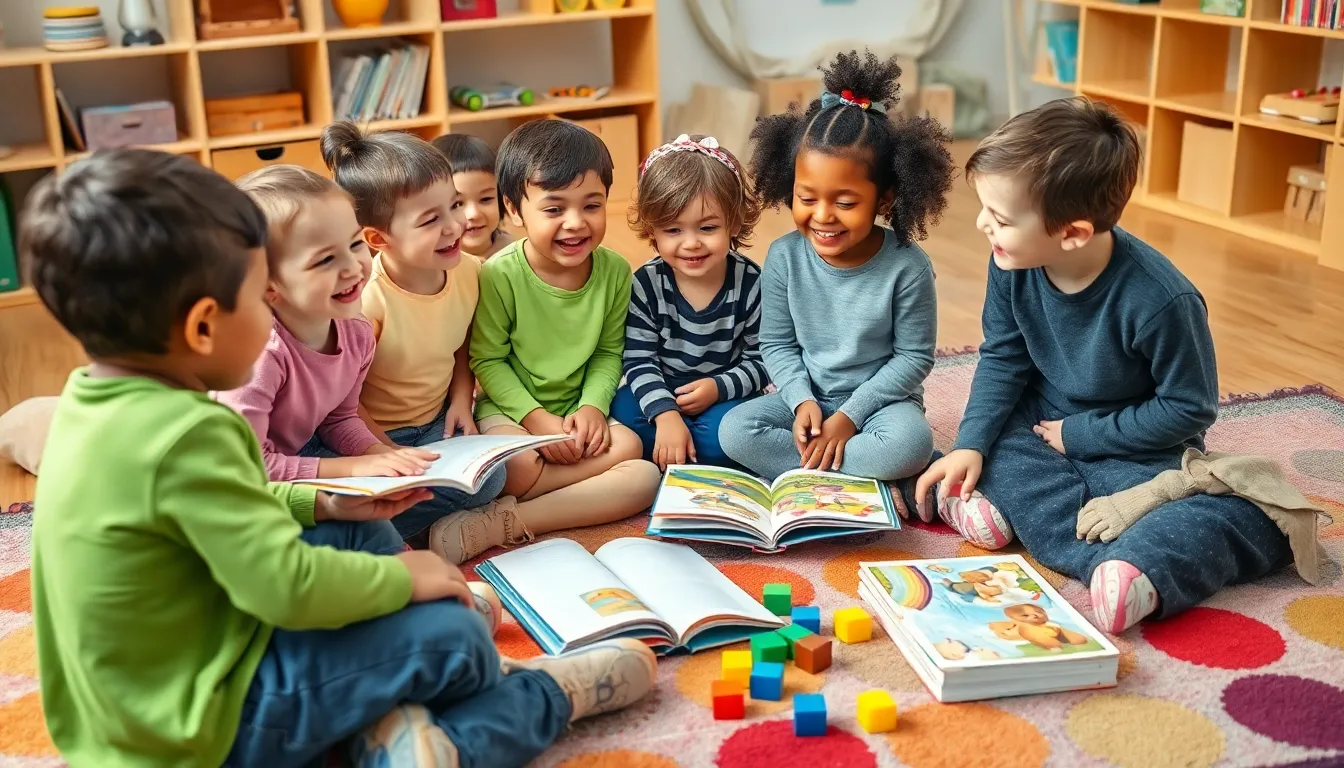Table of Contents
ToggleIn the bustling world of preschool, tiny voices are discovering the magic of language. It’s a delightful chaos where words tumble out like confetti, and every “uh-oh” or “more juice” is a monumental step toward communication mastery. Preschool language development isn’t just about learning to talk; it’s about unlocking a treasure trove of social skills, creativity, and self-expression.
Importance of Preschool Language Development
Preschool language development plays a crucial role in a child’s overall growth. Communication skills acquired during these early years lay the groundwork for future learning. Children learn to express their thoughts, emotions, and needs more effectively, facilitating better interactions with peers and adults.
Social skills significantly improve as children engage in conversations. Participating in group activities allows them to practice turn-taking, listening, and responding, which are essential for building relationships. Creative expression flourishes through language development, enabling children to share stories and ideas, fostering imagination.
Cognitive development benefits from enhanced language abilities. Vocabulary expansion occurs through exposure to new words and concepts, enriching a child’s understanding of the world. Research shows that robust language skills correlate with academic success later in life, underlining the importance of nurturing these abilities from the start.
Early literacy skills emerge alongside spoken language development. Recognizing letters, sounds, and words builds a foundation for reading and writing. Engaging in storytelling and rhyming games promotes phonemic awareness, which is vital in developing strong literacy skills.
Parental involvement also plays a significant role in preschool language development. Encouraging conversations at home and reading together can enhance a child’s linguistic abilities. Regular discussion fosters a love for language, making it easier for children to express themselves confidently.
Establishing a strong linguistic foundation during preschool years is essential for lifelong communication skills. Children equipped with these skills navigate social interactions with ease, paving the way for future success in both academic and personal endeavors.
Key Stages of Language Development

Preschool language development occurs through distinct stages, each contributing to a child’s communication skills. Understanding these stages highlights the importance of early linguistic experiences.
Phonemic Awareness
Phonemic awareness entails recognizing and manipulating individual sounds in spoken words. This skill serves as a foundation for reading. Activities like rhyming and phoneme segmentation engage children, making learning enjoyable. Research shows that strong phonemic awareness leads to better reading abilities. Young children who practice phonemic tasks often outperform their peers in literacy. Effective preschool programs integrate these activities, promoting essential skills for future reading success.
Vocabulary Growth
Vocabulary growth is a significant aspect of language development in preschool-age children. As children interact with caregivers and peers, they acquire new words and understand their meanings. Engaging in activities such as reading books or playing word games stimulates this growth. Wide exposure to diverse vocabulary enhances a child’s understanding of various concepts. Studies indicate that a richer vocabulary correlates with improved academic performance later in life. Encouraging conversations with children fosters their ability to express ideas clearly and confidently.
Sentence Structure
Sentence structure development begins with simple phrases and evolves into more complex constructions. During preschool, children experiment with different sentence types, enhancing their communication skills. Adults play an essential role by modeling varied sentence structures during conversations. As children gain confidence, they start using descriptive language and combining ideas. Research indicates that children who practice constructing sentences exhibit better overall language skills. Encouraging creative expression through storytelling supports this growth, allowing children to explore their thoughts and feelings.
Influencing Factors
Various factors significantly influence preschool language development. Notably, the family environment and educational setting serve as key components in this process.
Family Environment
Family interactions greatly impact language skills. Engaging conversations between parents and children foster vocabulary expansion and comprehension. Reading together strengthens linguistic abilities, with shared storytelling enhancing narrative skills. Encouragement from family members creates a supportive atmosphere for practicing new words and phrases. Regular exposure to diverse language experiences builds a solid foundation for communication. A nurturing family dynamic significantly contributes to a child’s confidence in expressing thoughts and feelings.
Educational Setting
The educational setting directly shapes language development during preschool years. Teachers create engaging environments filled with language-rich activities. Circle time discussions promote turn-taking and active listening among peers. Storytime sessions introduce new vocabulary and phonemic awareness through fun, interactive methods. Frequent group activities encourage collaboration and communication skills while enhancing social interactions. A well-structured curriculum tailored to diverse learning styles facilitates effective language acquisition. The preschool environment plays a crucial role in laying the groundwork for lifelong communication skills.
Strategies to Encourage Language Development
Fostering language development in preschoolers requires intentional strategies. Engaging activities play a critical role in enhancing communication skills.
Interactive Reading
Interactive reading involves engaging with children during storytime. Parents and educators ask questions about the story to encourage critical thinking. This active involvement promotes vocabulary growth and comprehension. Familiarity with characters and settings enriches discussions about the narrative. Participating in dialogue about pictures encourages children to describe what they see, further developing their expressive language. Turning reading into a conversation makes it a valuable tool for language acquisition. Repetition of favorite stories reinforces understanding and familiarity with language patterns.
Play-Based Learning
Play-based learning serves as a dynamic approach to language development. Children learn language through imaginative play scenarios, such as role-playing or building with blocks. This interaction provides opportunities to practice vocabulary and concepts in relatable contexts. Engaging in cooperative games encourages turn-taking, teamwork, and sharing ideas. Social interactions during playtimes enhance verbal communication and listening skills. Exploring different toys allows children to describe their creations and experiences, expanding their expressive language. Facilitating playtime with peers promotes informal conversations that build confidence in self-expression.
Challenges in Language Development
Challenges in language development can impact a child’s ability to communicate effectively. Preschoolers may face various hurdles, which can affect their social interactions and academic readiness.
Speech Delays
Speech delays occur when a child’s verbal communication lags behind typical milestones. Approximately 10% to 15% of preschoolers experience noticeable speech delays. Delays can affect articulation, vocabulary, and sentence structure. Early identification and intervention are crucial for addressing speech challenges. Specific therapies, such as speech-language therapy, can provide personalized strategies for improvement. Engaging parents and caregivers in supportive practices further enhances progress.
Bilingualism Considerations
Bilingualism presents both advantages and challenges in language development. Approximately 20% of preschoolers grow up in bilingual households. Exposure to multiple languages benefits cognitive flexibility and problem-solving skills. While vocabulary in each language may develop at varying rates, children often experience cross-language influence. Parents should maintain a consistent language approach to support balanced development. Resources such as bilingual storybooks can foster language skills effectively.
Preschool language development is a crucial phase that shapes a child’s communication skills and social interactions. By fostering a rich linguistic environment at home and in educational settings, parents and teachers can significantly enhance children’s verbal abilities. Engaging activities like interactive reading and play-based learning not only promote vocabulary growth but also build confidence in expression.
Addressing challenges such as speech delays and bilingualism early on ensures that every child has the opportunity to thrive in their language journey. As they master these essential skills, children lay a solid foundation for future academic success and personal growth. Investing time and effort in nurturing language development during these formative years is key to unlocking a child’s potential.




